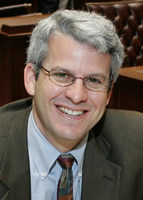Senate Approves Expansion of Business-Friendly Health Insurance Premium Assistance Plan
 Senator Tom Adelson
Senator Tom Adelson
A measure that will expand the most innovative public-private partnership in Medicaid history won approval by the full State Senate Thursday and is headed for the Oklahoma House of Representatives.
Senate Bill 1294 increases the number of small businesses eligible to take part in the Oklahoma Premium Assistance Plan, which combines state and federal funds to offer low-cost health insurance for employees of small businesses. Currently enrollment in the plan is limited to businesses with 25 or fewer employees. SB 1294, authored by Tulsa Democratic Senator Tom Adelson, makes businesses with 50 or fewer employees eligible for the plan.
The measure is part of the Senate Democrats “Agenda to Strengthen Small Business.”
“Expanding the Premium Assistance Program will make health insurance an affordable benefit for more employers and their employees. Having access to affordable, quality medical care will make workers healthier and more productive. A more productive workforce means a healthier bottom line for small businesses,” Adelson said.
Adelson developed the plan while serving as Governor Henry’s first Secretary of Health in 2003-2004. He said funding provided by a portion of the tobacco tax increase approved by voters two years ago is available to insure 70,000 previously uninsured working Oklahomans.
Approximately 700,000 Oklahomans, almost one-fifth of the state’s population, are uninsured. They rarely receive preventative care; often wait until they are the sickest to seek medical attention; and then receive care from the most expensive outlets, hospital emergency rooms. More than 70 percent of the uninsured in Oklahoma are employed or are the dependents of uninsured workers.
“Faced with alarming increases in the cost of health insurance, this is vital help for working families and small business and could not come at a more important time,” Adelson said.
In the program, businesses pay 25 percent of the cost of health insurance for their employees. The state and federal funds pay 60 percent of the cost and the employee pays the final 25 percent.
“This program promotes personal responsibility by both employers and their employees. Businesses and workers who are willing to take on the responsibility of contributing to the cost of their health insurance are rewarded because the state contribution keeps the cost down,” Adelson said.
 Oklahoma Senate
Oklahoma Senate

